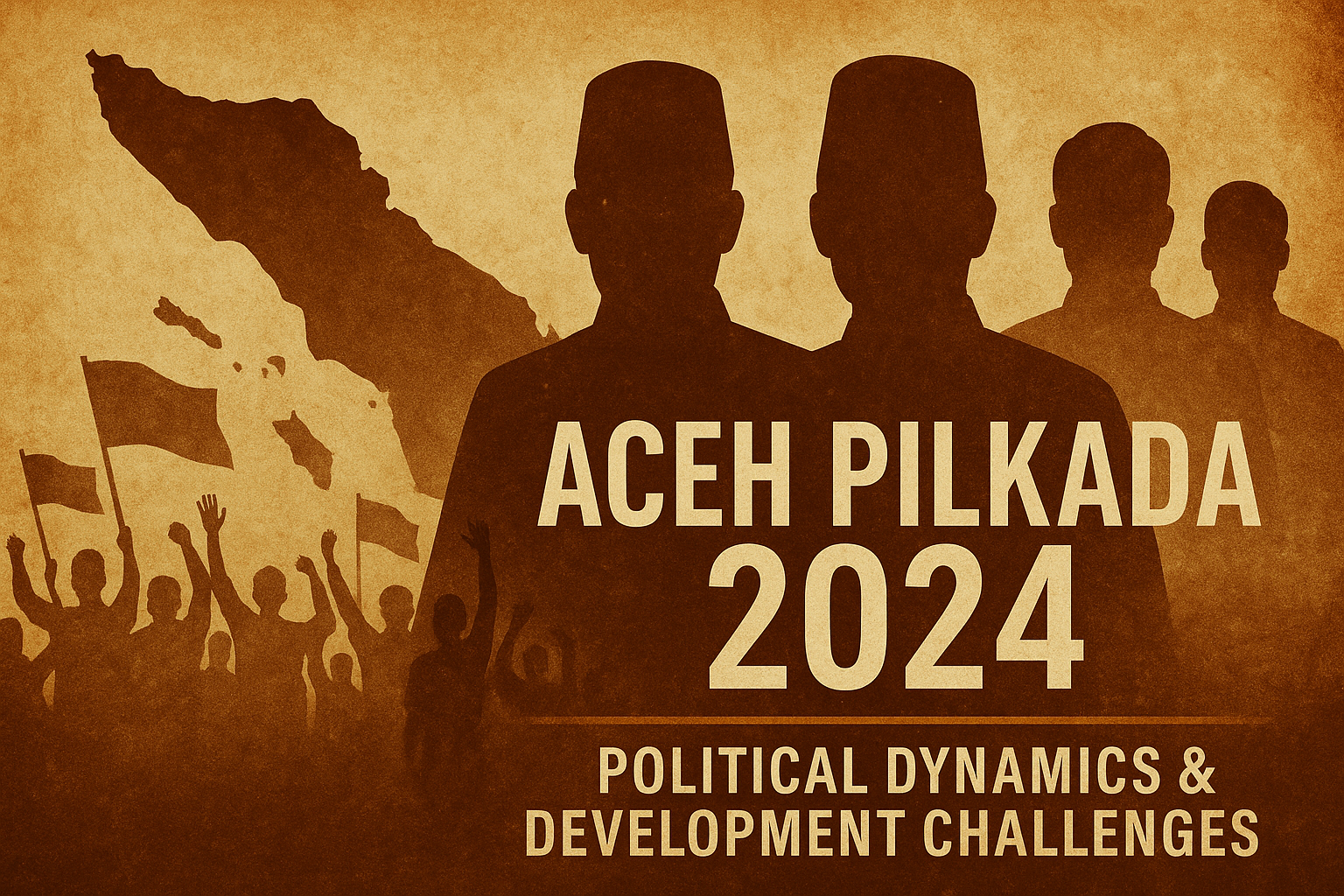Introduction
The upcoming Pilkada Aceh 2024 is more than just an electoral contest—it represents a battle of ideas, networks, and influence that will shape Aceh’s political trajectory for the next five years. Uniquely, this election will only feature two candidate pairs, each carrying its own historical weight and political credibility. The limited competition raises the stakes higher, as the results will determine which elite circle secures control over Aceh’s political and economic future.
Two dominant figures are set to contest the leadership of Aceh. On one side, the Aceh Party, strongly tied to former combatants and nationalist sentiment, nominates Muzakir Manaf (Mualem) with Fadhlullah as his deputy. On the other, a technocratic pairing of Bustami Hamzah and Fadhil Rahmi (Tu Sop’s choice) brings the image of modern professionalism blended with clerical legitimacy.
While the election will conclude in November 2024, the political story does not end at the ballot box. Instead, it begins a new cycle—one of victory panic, cabinet bargaining, project wars, and the shadow play of power brokers. This essay elaborates on what typically unfolds in Aceh after the euphoria of electoral victory and why these patterns make it difficult for the people to expect meaningful development outcomes.
Post-Victory Fuss: The First Panic
In Aceh, the first night after the quick count results often determines the psychological climate of victory. Those who feel they have “won who won” immediately celebrate, while those who sense defeat prepare narratives of “winning who is considered to have won.”
The real panic does not come from defeat but from success. The winning coalition, previously united under one banner, begins to fracture. Formerly “we,” the unified campaign machine rapidly splinters into “they” and “us.” Every actor—financiers, volunteers, clerics, former rebels, businessmen—rushes to claim credit.
The elected leader, once easily accessible, suddenly becomes increasingly distant. A “Shadow Ruler” emerges, an unelected power broker who filters access to the new governor. Families, too, nurture expectations of new privileges. Within weeks, Aceh witnesses the birth of concentric circles of power: Ring One, Ring Two, and Ring Three. Coffee shops across Banda Aceh buzz with gossip, resentment, and betrayal.
This “first panic” is a recurring ethnographic reality of Aceh’s politics. The campaign narrative of loyalty dissolves into slander, with losers sidelined and “betrayed comrades” telling their grievances over endless cups of coffee.
Cabinet Chaos: From Hope to Horse-Trading
The formation of the provincial cabinet is arguably the hottest battlefield after Pilkada. In theory, appointments should be based on expertise and public service. In practice, seats are traded like commodities.
Departments in Aceh are classified informally as “wet” or “dry.” Wet posts—such as public works, health, and transportation—are prized for their access to development funds and project kickbacks. Dry posts, often less lucrative, are given as consolation prizes.
Political parties, campaign financiers, and key supporters push their nominees aggressively. The Shadow Ruler, acting as a political bartender, mixes promises, offers, and bargains. Media spectacles—such as academic “tests” or clerical endorsements—mask the backroom deals.
Ultimately, cabinet selection reflects not merit but repayment of political debts. Officials, once appointed, are burdened with expectations to return favors. As a result, governance becomes secondary to clientelism.
Fighting for “Meu’en Proyek”
Perhaps the most entrenched practice in Aceh’s political economy is “meu’en proyek”—playing with projects. Development initiatives, from road repairs to school buildings, are often captured by competing networks seeking financial benefit rather than public service.
Projects are frequently unfinished, poorly executed, or repeatedly rebuilt without meaningful impact. Contractors win tenders not for competence but for loyalty to the Leader’s circle. Even clerics and intellectuals are mobilized to give legitimacy to questionable deals.
Coffee shops again become political stages, where disillusioned Success Teams recount tales of broken promises. These disgruntled groups sometimes evolve into oppositional factions within government, undermining stability from within.
The meu’en culture ensures that development is rarely transformative. Instead, it becomes a cycle of short-term enrichment and long-term stagnation.
Strong People in Jakarta: The Illusion of Power
A unique feature of Aceh’s politics is its constant invocation of Jakarta’s “strong people.” Campaigners and officials often claim to have direct ties to the Presidential Palace, intelligence circles, or party chairmen in the capital.
“A1 info” circulates like whispered secrets: assurances that a project will be secured, or threats that a rival will be crushed by connections in Jakarta. These narratives serve as tools of intimidation and persuasion in local politics.
Yet in reality, such claims rarely translate into substantial development. Instead, they reinforce dependency and manipulation, where Acehnese leaders justify inaction by blaming external actors or using them as shields for self-interest.
Since the post-tsunami and post-MoU Helsinki periods, Jakarta’s shadow has loomed large in Aceh. But instead of facilitating recovery and progress, it often amplifies elite fragmentation.
Conclusion: A Cycle of Hopes and Disappointments
Based on these recurring dynamics, Pilkada Aceh 2024 is unlikely to produce dramatic improvements in public welfare. For two decades, political transitions in Aceh have been characterized by cycles of victory panic, cabinet bargaining, project wars, and manipulation by shadow rulers and external actors.
The people’s hope for change is continually hijacked by elite struggles. Development budgets are fragmented across networks, while governance becomes hostage to factional interests. The result is predictable: roads repaired repeatedly, schools left unfinished, poverty statistics unchanged.
Until Aceh breaks free from this ethnographic pattern of post-victory chaos, the Pilkada will remain a ritual of hope that delivers little. What we witness is not merely local politics but an entrenched culture of power as spoils, where the ultimate losers are the very people whose votes made the victory possible.






Leave a Reply